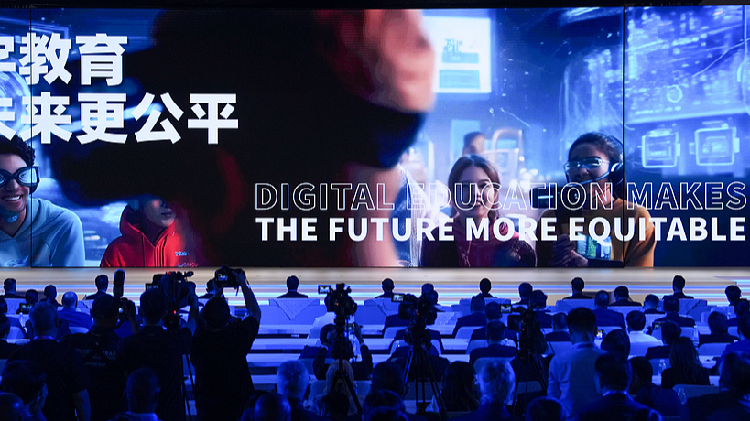Our Privacy Statement & Cookie Policy
By continuing to browse our site you agree to our use of cookies, revised Privacy Policy and Terms of Use. You can change your cookie settings through your browser.
Wang Yan
Copied
The 2025 World Digital Education Conference, themed “Education Development and Transformation: The Era of Intelligence,” opens in Wuhan, central China’s Hubei Province, May 14, 2025. /CFP
Editor’s note: Wang Yan, a special commentator on current affairs for CGTN, is a senior specialist from Beijing Foreign Studies University. The article reflects the author’s opinion, and not necessarily the views of CGTN.
China is committed to advancing digital transformation of education and scaling up intelligent technologies in education to create an inclusive, equitable, intelligent quality education system that can facilitate lifelong learning for people of all ages. This will be achieved, in particular, through high-level international cooperation, technology-empowered education transformation, infrastructure connectivity and resource sharing, as well as collaboration to strengthen ethical and security safeguards in digital education.
This was the message delivered by Chinese Vice Premier Ding Xuexiang at the recent 2025 World Digital Education Conference (WDEC) held in Wuhan, central China’s Hubei Province from May 14 to 16, bringing together heads of international organizations, representatives from universities and schools, and experts to discuss education development and transformation in the era of intelligence.
Why digital education? Because studies show that 40 percent of the core skills that are the norm today will be replaced by artificial intelligence (AI) by 2030 or even sooner, given the pace of technological advancement. The majority of students are already using AI, which is as high as 92 percent in the universities in the UK.
Against this backdrop, the focus of education has shifted from simple knowledge transfer to 21st-century competencies that increasingly value critical thinking and high-order thinking skills. Pedagogy is also changing, from lectures to human-machine collaboration that maximizes the quality and efficiency of teaching.
It is in such context that the 2025 WDEC was convened to explore new approaches to innovate education content, methods and modalities with the transformative power of emerging technologies, through sharing policies and practices and envisioning the future directions of education development.
The conference showed the future of education, demonstrating future classrooms, future schools and the future work of teachers as well as the scenario of collaborative teacher-student-machine interaction that will become a norm in the AI era. The participants also made school, university, vocational college and open university visits to observe how digital technology can empower teaching and learning processes in different learning stages.
Overall, it was a cross-culture, cross-disciplinary and cross-sector dialogue in which stakeholders from various countries shared their insights and perspectives on the approaches, strategies and methods of the digital transformation of education.
A highlight was the ministerial dialogue between China and the Association of Southeast Asian Nations focusing on talent cultivation, academia-industry cooperation and pedagogical application of AI, showing the power of cooperation. Documents on digital education launched at the conference, such as a white paper on smart education in China and the Global Digital Education Development Index 2025, outlined visions for transforming the education system while showcasing the effect of synergy created through collaboration of key stakeholders.
Humanoid robots for pedagogical application are exhibited at the 2025 World Digital Education Conference in Wuhan, central China’s Hubei Province, May 14, 2025. /CFP
AI is central to the discourse of digital education, bringing the most fundamental changes to education, and presenting both opportunities and challenges. While the essence of education remains unchanged, AI offers opportunities for scalable personalized education on one hand.
On the other hand, it is also widening the digital divide across the globe. By the end of 2020, nearly two-thirds of the world’s school-age children had no Internet access at home. Validating AI tools for education is not an easy thing. Besides the challenges of formulating AI ethics regulations, there is also the concern about super-intelligence surpassing human intelligence.
In the face of these changes, educators around the world are grappling with the same question: What will be the future trends of AI development? What changes will it bring to the transformation of education? What will be the core competencies for teachers, leaders and students in the AI era? What global frameworks, common principles can direct education transformation?
Although AI is a key instrument for shaping the future of education, it is human collaboration that inspires and catalyzes solutions to the shared challenges. Such collaboration will continue. This is what the annual WDEC is about with its collective efforts to advance global education reform and development.
Moreover, the World Digital Education Alliance, established last year, held its first general assembly at this year’s conference, providing a platform for further dialogue, networking and development of knowledge products.
All this is part of the journey integrating AI and education for a more inclusive and human-centered system. Equipped with increased knowledge and global digital cooperation, we are together embracing a better future of education.
(If you want to contribute and have specific expertise, please contact us at opinions@cgtn.com. Follow @thouse_opinions on Twitter to discover the latest commentaries in the CGTN Opinion Section.)
EXPLORE MORE
CHOOSE YOUR LANGUAGE
DOWNLOAD OUR APP
互联网新闻信息许可证10120180008
Disinformation report hotline: 010-85061466
EXPLORE MORE
CHOOSE YOUR LANGUAGE
DOWNLOAD OUR APP
互联网新闻信息许可证10120180008
Disinformation report hotline: 010-85061466
